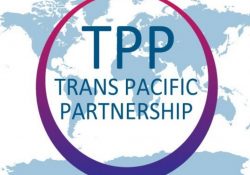Search Results for: car t
USTR FOIA, 127 pages of emails between industry and USTR TPP negotiators
Earlier this year, IP-Watch submitted two FOIA requests to USTR about the TPP negotiation. I am attaching two letters from USTR to IP-Watch about the FOIAs, and a file with 127 pages of emails between USTR and various industry lobbyists. (USTR provided KEI with copies of the files provdied to IP-Watch as part a separate KEI FOIA to USTR regarding communications involving the TPP).
A lot has clearly been withheld by USTR. According to USTR’s June 19, 2013 letter to IP-Watch
TPP provisions on Injunctions, are the TRIPS exceptions in or out?
Introduction
This note looks at the TPP, ACTA and TRIPS provisions on injunctions, and finds the TPP text unclear, as regards the possibility of exceptions to the obligation to make injunctions available in cases in of infringements. We have asked USTR and USPTO to clarify this issue.
Discussion
The TRIPS text on injunctions reads as follows:
Section 2: civil and administrative procedures and remedies
Article 44 – Injunctions.KEI TPP Note: Damages language in IP Chapter conflicts with US copyright law, blocks Green Paper reforms
Subject: TPP, damages, US copyright law
KEI TPP Note: IP Chapter language on damages conflicts with US copyright law, and blocks reforms being considered by the USPTO Green Paper
20 November 2013
Leaked TPP Text Versus the USPTO Green Paper: Cell Phone Unlocking
The USPTO’s green paper on “Copyright Policy, Creativity and Innovation in the Digital Economy” surveys current copyright law and notes that there are several areas where reform may be welcome. In many of these areas, the USPTO green paper demonstrates an openness to discussion on these issues or support existing efforts and proposals. Despite this support in some areas for reform and despite the USPTO’s involvement in the Trans-Pacific Partnership (TPP) negotiating process, there are several areas where the United States’ position in the TPP could hinder such reform. Continue Reading
KEI analysis of Wikileaks leak of TPP IPR text, from August 30, 2013
KEI Comments on the August 30, 2013 version of the TPP IP Chapter
For more information, contact James Love, mailto:james.love@keionline.org, mobile +1.202.361.3040.
GE’s Thaddeus Burns wrote to US Ambassador Betty King requesting US postpone Marrakesh Diplomatic Conference
Thaddeus Burns of GE spent months trying to derail the WIPO treaty for the blind negotiations NIH March-In request, now more than year old
The October 25, 2012 NIH March-In Request for ritonavir is now more than one year old, and the NIH has not decided to grant a hearing or reject the petition.
More information about the March-In request is available here:
https://www.keionline.org/2012ritonavir
NGOs, academics evaluate four USTR negotiators in TPP IPR negotiations
KEI has asked 21 persons following the TPP IPR negotiations, what they thought of four of the USTR negotiators, including:
- Ambassador and USTR head Michael Froman,
- TPP Chief negotiator Barbara Weisel
- Assistant USTR for Intellectual Property and Innovation Stanford McCoy, and
- Deputy Assistant USTR for Intellectual Property and Innovation Probir Mehta.
Are Nike, IOC and European football leagues scoring new IPR at the WTO?
At the request of the European Union, Jamaica, Mexico and the United States of America, the topic of “Intellectual Property and Sports” was placed for discussion at the World Trade Organization’s (WTO) October 2013 session of the Council for TRIPS (TRIPS Council).


